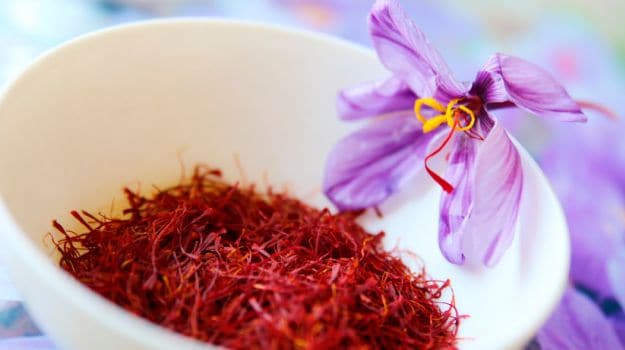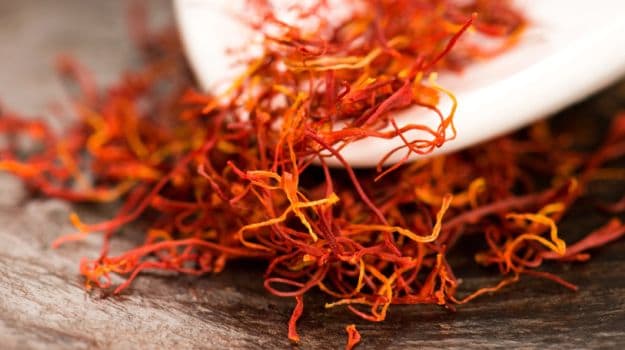SAFFRON

Are you looking for health benefits of kesar? If yes, then you have come to the right place. But, first let's learn some important facts about this wonder spice. Saffron is a small, bulbous, perennial spice, a member of the lily family. To produce saffron, the stigmas [the part of the flower, which catches pollen] must be painstakingly handpicked, cut from the white style and then carefully laid on a sieve and cured over heat to deepen the flavor- a process so labor intensive that saffron is the most expensive spice in the world. Currently saffron is commercially produced in Iran, Greece, Morocco, Spain, Kashmir and Italy. Iran is the most important producer of saffron both, in terms of volume and quality, and Spain being the largest importer of the spice. Saffron is a labour intensive crop, which makes it so expensive. It has three delicate crimson stigmas in the centre, which are hand-picked, placed on a riddle, and cured over heat to amplify its flavour. Apart from being the most expensive spice, there are many benefits of saffron, which makes it even more special.
Here Are 7 Health Benefits Of Saffron (Kesar):
The benefits and medicinal properties of this highly priced spice, make it a valuable culinary ingredient worldwide. Modern research suggests that saffron can be used as an aphrodisiac, diaphoretic [to cause sweating], carminative [to prevent gas] and to bring on mensuration. Some other benefits are mentioned here under:
2. Promotes learning and memory retention: Recent studies have also demonstrated that saffron extract, specifically its crocin, is useful in the treatment of age related mental impairment. In Japan, saffron is encapsulated and used in the treatment ofParkinson’s disease, memory loss and inflammation.
3. In delayed puberty: In under developed girls, saffron has an overall stimulant effect. A pinch of saffron crushed in a table spoon of milk is useful to stimulate hormones and bring about desired effect.
4. To increase vitality: In low libido saffron aids as a sexual stimulant and can be consumed in a dose of a pinch in a glass of milk at bed time.
5. In patchy baldness: Saffron mixed in liquorice and milk makes an effective topical application to induce hair growth in alopecia.
6. Protection against cold: Saffron is a stimulant tonic and very effective to treat coldand fever; saffron mixed in milk and applied over the forehead quickly relieves cold.

Health benefits of saffron: Saffron is a stimulant tonic and very effective to treat cold
7. Food Additives: Saffron is an excellent replacement for synthetic food additives- for eg: instead of FD and C yellow no 5: a synthetic food coloring agent that is a very common allergy trigger, Saffron’s glorious yellow could be an acceptable hypoallergenic choice.
With these kesar benefits known to us, this culinary treasure has to be used and especially in the winter months. Here are some serving ideas:
1. For a wonderful marinade for fish, add saffron threads, garlic and thyme to vinegar.
2. Use saffron to give cakes, pastries and cookies a buttery golden hue and a rich aroma.
3. Cook biryanis with saffron combined with cloves, cinnamon, Indian bay leaves and nutmeg for a memorable treat.
4. Crush a tiny piece of saffron into a glass of champagne or sparkling apple cider and turn the drink into a golden elixir.
5. Coffee spiced with saffron and cardamom is a soothing and heart healthy drink.
6. Add saffron and cinnamon to whole milk or yogurt and honey for a simple version of the famous Indian yogurt drink, lassi.
Saffron as a spice, is generally regarded as safe, however it is not recommended during pregnancy and nursing. It also must also be pointed that large doses i.e. more than 1 or 2 table spoons can be toxic, although saffron poisoning is very rare
5. Coffee spiced with saffron and cardamom is a soothing and heart healthy drink.
6. Add saffron and cinnamon to whole milk or yogurt and honey for a simple version of the famous Indian yogurt drink, lassi.
Saffron as a spice, is generally regarded as safe, however it is not recommended during pregnancy and nursing. It also must also be pointed that large doses i.e. more than 1 or 2 table spoons can be toxic, although saffron poisoning is very rare
